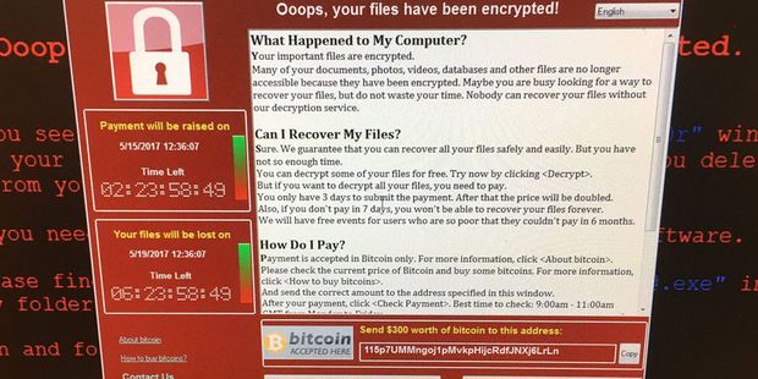
Researchers believe hacking tools developed by the US National Security Agency were used in a global cyber attack that hit international shipper FedEx, disrupted Britain's health system and infected computers in nearly 100 countries.
READ MORE: Security expert: Huge cyber attack likely to reach NZ
Cyber extortionists tricked victims into opening malicious malware attachments to spam emails that appeared to contain invoices, job offers, security warnings and other legitimate files on Friday.
The ransomware encrypted data on the computers, demanding payments of $US300 to $US600 to restore access.
Security researchers say they observed some victims paying via the digital currency bitcoin, though they did not know how many had given in to the extortionists.
Researchers with security software maker Avast say they had observed 57,000 infections in 99 countries with Russia, Ukraine and Taiwan the top targets.
The most disruptive attacks were reported in Britain, where hospitals and clinics were forced to turn away patients after losing access to computers.
International shipper FedEx Corp says some of its Windows computers were also infected.
"We are implementing remediation steps as quickly as possible," it said in a statement.
Only a small number of US-headquartered organisations were hit because the hackers appear to have begun the campaign by targeting those in Europe, said Vikram Thakur, research manager with security software maker Symantec.
By the time they turned their attention to the United States, spam filters had identified the new threat and flagged the ransomware-laden emails as malicious, Thakur said.
The US Department of Homeland Security said late on Friday that it was aware of reports of the ransomware, was sharing information with domestic and foreign partners and was ready to lend technical support.
Telecommunications company Telefonica was among many targets in Spain, though it said the attack was limited to some computers on an internal network and had not affected clients or services. Portugal Telecom and Telefonica Argentina also said they were targeted.
Private security firms identified the ransomware as a new variant of "WannaCry" that had the ability to automatically spread across large networks by exploiting a known bug in Microsoft's Windows operating system.
"Once it gets in and starts moving across the infrastructure, there is no way to stop it," said Adam Meyers, a researcher with cyber security firm CrowdStrike.
The hackers, who have not come forward to claim responsibility or otherwise been identified, likely made it a "worm," or self spreading malware, by exploiting a piece of NSA code known as "Eternal Blue" that was released last month by a group known as the Shadow Brokers, researchers with several private cyber security firms said.
"This is one of the largest global ransomware attacks the cyber community has ever seen," said Rich Barger, director of threat research with Splunk, one of the firms that linked WannaCry to the NSA.
The Shadow Brokers released Eternal Blue as part of a trove of hacking tools that they said belonged to the US spy agency.
Microsoft on Friday said it was pushing out automatic Windows updates to defend clients from WannaCry. It issued a patch on March 14 to protect them from Eternal Blue.
The spread of the ransomware capped a week of cyber turmoil in Europe that kicked off a week earlier when hackers posted a huge trove of campaign documents tied to French candidate Emmanuel Macron one and a half days before a run-off vote in which he was elected as the new president of France.
On Wednesday, hackers disputed the websites of several French media companies and aerospace giant Airbus.
Also, the hack happened four weeks before a British parliamentary election in which national security and the management of the state-run National Health Service (NHS) are important campaign themes.
On Friday, Russia's interior and emergencies ministries, as well as the country's biggest bank, Sberbank, said they were targeted.
The interior ministry said on its website that around 1,000 computers had been infected but it had localised the virus.
Take your Radio, Podcasts and Music with you









